

SpringerBriefs in
Environment, Security, Development and Peace (ESDP)
A Peer-reviewed Book Series
Edited by
Hans Günter Brauch,
AFES-PRESS, chairman
Free University of Berlin (Ret.)
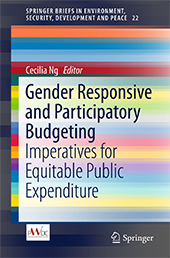 |
Cecilia Ng (Ed.): Gender Responsive and Participatory Budgeting: Imperatives for Equitable Public Expenditure. SpringerBriefs in Environment, Security, Development and Peace, vol. 22 (Cham– New York – Heidelberg – Dordrecht – London: Springer International Publishing, 2016).
ISBN (Print): 978-3-319-24494-5
ISBN (Online/eBook):978-3-319-24496-9
DOI: 10.1007/978-3-319-24496-9
Order Form
Order this book on the Springer Website
Order electronic version and individual chapters |
| |
|
About this book
-
A unique book focusing on the hybridization of grassroots participation in planning, implementing, and developing gender-responsive budgeting
-
Presents case studies from the field that show the different ways in which gender-responsive and participatory budgeting is being implemented in Malaysia, Indonesia, India, and the Philippines
-
Provides theoretical papers that trace the various developments in the field
This unique book explores the exciting new democratic spaces that open up when budgets get participatory. The experiences of gender responsive budgeting (GRB) meet the world of participatory budgeting (PB), both of which have gained traction since the 1980s. The chapters bring together GRB and PB policy makers, practitioners, researchers and civil society actors to share and review their respective journeys. The book is a valuable contribution to current debates on re-thinking GRB and PB and the need to synergize both approaches to achieve gender equality, social justice and good governance. It is relevant to professionals in government and the private sector as well as to non governmental organizations and students in gender and development and public policy.
“The book addresses the critical issue of citizen participation through a conversation between those involved in participatory budgeting and gender responsive budgeting approaches. It is rich in case studies and offers the promise of a new direction for entwining women’s and men’s participation by building a broad based expertise in budget analysis and good financial governance.” (Rhonda Sharp)
On the Contents
Making Public Expenditures Equitable: Gender Responsive and Participatory Budgeting: Cecilia Ng
Part I: Gender Responsive and Participatory Budgeting: Narratives of Change and Innovation
Interlinking Gender Responsiveness and Participation in Public Budgeting Processes: Regina Frey Women in Budgeting: A Critical Assessment of Participatory Budgeting Experiences: Giovanni Allegretti and Roberto Falanga Gender Responsive and Participatory Budgeting in Penang: The People-oriented Model: Shariza Kamarudin Community Participation and Women’s Empowerment: The Kerala Experience of Participatory Planning and Budgeting: Sunny George
Part II: Implementing Gender Responsive Budgeting Tools for Gender Equality and Social Justice
Integrating Gender Equality, Women’s Rights and Participation in the Budget Process: A Survey of Entry Points and Practical Examples: Elisabeth Klatzer Malaybalay City Integrated Survey System: A Tool for Gender Responsive Budgeting in Local Governance: Herculano S. Ronolo
Part III: Institutionalizing GRB: Towards Better Accountability and Good Governance
Localizing Gender and Participatory Budgeting: Challenges of Institutionalization in Penang, Malaysia: Aloyah A. Bakar, Patahiyah Ismail and Maimunah Mohd Sharif Institutionalizing Gender Responsive Budgeting in National and Local Governments in Nepal: Purusottam Nepal Gender Responsive Budgeting: State and Civil Society Initiatives at National and Sub-national Levels in Indonesia: Agus Salim On Penang Women’s Development Corporation (PWDC)
- On the Editor - On the Authors - Index
On the Editor
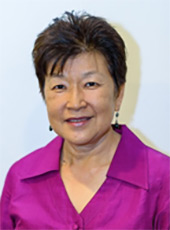 |
Dr. Cecilia Ng (Malaysia) is an independent researcher and women’s rights advocate. She received her Master’s from Harvard University and her PhD in Sociology from Universiti Malaya. Her latest appointment was at the Women’s Development Research Centre (KANITA), Universiti Sains Malaysia where she was a Visiting Professor (2007-2011) and Honorary Consultant (2011-2013). She was previously an Associate Professor at Universiti Putra Malaysia before she opted for early retirement in 2000. From 1994 till 1999 she was a Research Fellow at the United Nations University Institute for New Technologies in The Netherlands.
Upon retirement, she continued in the academe as Visiting Associate Professor at the Asian Institute of Technology, Thailand, where she was also an editor of the journal Gender, Technology and Development (2001–2006). In 2011, she was appointed as a Director, as well as the Advisor of the Gender Responsive and Participatory Budget Project, of the Penang Women’s Development Corporation (PWDC), a state-run body established to promote gender equality and social justice in Penang.
She has conducted research and published widely on gender, development and work, with a focus on globalization, technological change, women’s employment and gender and democracy. She is active in women’s groups in Malaysia and has been involved in research, training and advocacy on gender issues since the early 1980s. Her recent publications include a co-edited volume on Gender and the Digital Economy (Sage, 2006), a co-authored book entitled Feminism and the Women’s Movement in Malaysia: An Unsung (R)evolution (Routledge, 2006), a co-edited Special Issue (2010) on Women in National Politics in Asia in the journal Gender, Technology and Development and a co-edited volume (2011), published by Universiti Sains Malaysia Press entitled Our Lived Realities: Reading Gender in Malaysia.
|
On the Authors
Giovanni Allegretti (Italy, Portugal) is an architect and Senior Researcher at the Centre of Social Studies, Faculty of Economics, Coimbra University (Portugal) where he coordinates the Ph.D. course “Democracy in the XXI century” and the Peoples’ Observatory. He has conducted research on the participatory budgeting process in Europe and South America.
Agus Salim (Indonesia) is the Programme Manager in PATTIRO, a non-profit organization set up in 1999 to promote decentralization and good governance through transparency, social accountability for public services and public finance. Previously, he was a director in PATTIRO Banten. His work is focused on public services issues, including the promotion of gender responsive budgeting at national and sub-national levels.
Aloyah A. Bakar (Malaysia) is presently the Chief Executive Officer of the Penang Women’s Development Corporation (PWDC), a state-linked company in Penang, Malaysia. As the former Project Director for Gender Responsive and Participatory Budgeting, her commitment and dedication in embarking on joint projects on gender responsive and participatory budgeting with the local councils and citizens on good governance and local democracy practices were rewarded when the project earned international recognition.
Roberto Falanga (Italy/Portugal) received his master’s degree from the University “La Sapienza” of Rome and he was a PhD fellow at the Centre for Social Studies (University of Coimbra) and received his PhD in 2013 for his study on cultural changes in public authorities implementing participatory processes.
Regina Frey (Germany) is a Political Scientist and Gender Mainstreaming Expert. She has considerable experience in applied gender research projects (evaluation of gender equality strategies, programmes and projects), and has been a consultant for the implementation of gender mainstreaming and gender budgeting for public administrations, universities and NGOs..
Sunny George (India) is HUDCO Chair Professor and Director of the South Asia School of Local Governance at the Kerala Institute of Local Administration (KILA), Kerala, India. His areas of interest include Applied Economics, Local Economic Development, Decentralisation and Local Governance, Participatory Planning, Training and Capacity Building and Managing Development Projects.
Elisabeth Klatzer (Austria) has extensive experience in research and civil society activism, and as a writer, lecturer and consultant in the fields of Gender Responsive Budgeting, Public Finance Management and Feminist Economics. She has experience in public administration and has been involved in the integration of GRB in the Austrian budget reform.
Maimunah Mohd Sharif (Malaysia) is the President of the Municipal Council of Seberang Perai (MPSP). Her contribution to Penang and Seberang Perai has been recognized by the Penang State government, Malaysian government and international organizations as “Best City Manager” and “Best City” by Europe Business Assembly, Stresa, Italy and “Planner of The Year 2014” by the Malaysian Institute of Planners.
Purusottam Nepal (Nepal) is Under Secretary of the Ministry of Federal Affairs and Local Development (MOFALD), working as National Programme Manager of Local Governance and Community Development Programme (LGCDP), a framework programme for improving inclusive local government in Nepal, funded by 14 Development Partners and the Government of Nepal.
Patahiyah Binti Ismail (Malaysia) was the first woman Municipal Secretary, Municipal Council of Penang Island (MPPP) in June 2009 and was subsequently appointed the first woman President in March 2010. In 2015, she became the first Mayor of the newly-formed Penang City Municipal Council.
Herculano (Allan) Ronolo (Philippines) is City Administrator, Malaybalay City, Philippines. He joined the government service in 1986 after teaching for nine years. He was appointed as the Local Planning and Development Coordinator and has served as the GAD Focal Person up to the present.
Shariza Kamarudin (Malaysia) is Senior Project Officer for the GRPB Project being implemented by the Penang Women’s Development Corporation in Penang, Malaysia. She has been with GRPB Team since February 2012 and has been particularly involved in community-based work with two low-cost flat communities.

On Penang Women’s Development Corporation (PWDC)
The Penang Women’s Development Corporation (PWDC) is a state agency which works towards the transformation of Penang into an advanced and progressive society through the promotion of equality among all women and men, girls and boys regardless of ethnicity, religion, gender or socioeconomic background. PWDC believes that Penang’s people are the key to her future and shared prosperity, and that all women and men, girls and boys must have the opportunities, rights and freedoms to develop their full potential as citizens who can contribute to achieving the visions and aspirations of the state.
Since its establishment in November 2011, PWDC has played a pivotal role as the key State Government agency working towards the mainstreaming of gender equality, social inclusion and good governance across all sectors in Penang. PWDC achieves this by working with partners to plan and implement gender-responsive projects, raise public awareness of gender issues, and build capacity among individuals and communities. PWDC also advocates measures to bridge gender gaps between women and men in the economy, public sphere, politics and governance.
As Penang progresses towards its aspiration of being an advanced society, PWDC will continue to strategize and execute multi-level and multi-pronged approaches to bring about meaningful and lasting change. PWDC envisions a future in which all women and men, girls and boys will have the equal opportunity to fully contribute to and benefit from a Penang which values and upholds the principles of democratic participation, respect for diversity and individual dignity, and social inclusion and social justice.
Vision
PWDC envisions a Penang which mainstreams gender into the policies and programmes of all sectors to achieve gender and social justice in the State.
Mission Statement
PWDC seeks to contribute to the transformation of Penang based on principles of substantive equality and good governance. Integral to our work is the recognition of women’s diverse identities, women’s representation in all spheres and the equitable redistribution of resources.
This will be achieved through research and advocacy on gender responsive policies, capacity development, strategic networking, and women’s empowerment programmes; working in smart partnership with all levels of the Penang state and local governments, non-governmental and community-based organisations, the academe, the private sector and the public.
Objectives
PWDC has five key objectives, namely:
-
To develop gender responsive policies and good governance;
-
To promote awareness and understanding of gender and social justice;
-
To enhance women’s participation in the socio-economic and political life of society;
-
To strengthen women’s leadership and decision making in all sectors of society; and
-
To enhance and promote an environment of inclusiveness within the multi-ethnic, multi-cultural and multi-religious context of Penang
PWDC Website at: <http://www.pwdc.org.my/content/home/index/site:pwdc-link:8360>
GRPB Project Website at: <http://mobipotcms.com/content/home/index/site:brg-link:4960>
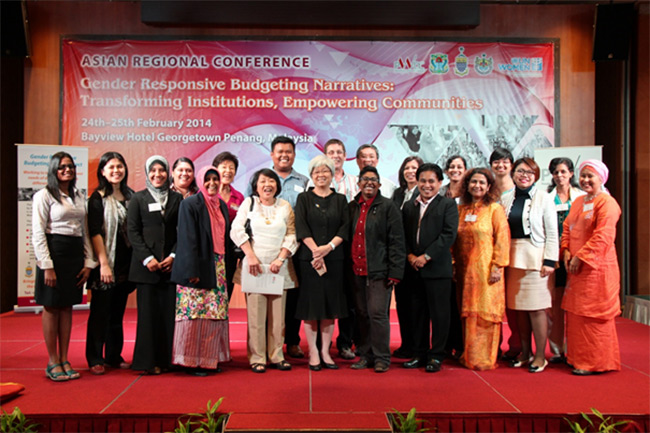
PWDC directors and staff who organised the GRB Conference.
The permission was granted by PWDC who provided the photo.
Book Lunch Event in Penang, Malaysia
| The launch of the book entitled 'Gender Responsive and Participatory Budgeting: Imperatives for Equitable Public Expenditure' was held in Penang, Malaysia on 31 March 2016. Both the international edition (Springer International) and the Malaysian and Singapore edition (Strategic Information and Research Development Centre) was officially launched by YB Chow Kon Yeow, Penang State Executive Councillor for Local Government. |
| |
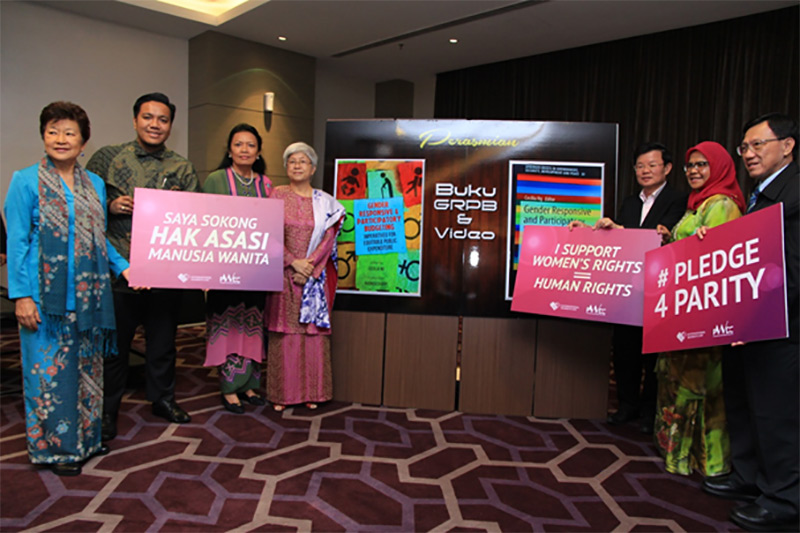 |
| |
|
| The photos depicting the launch are provided by PWDC who granted permission to use them here. |
| |
|
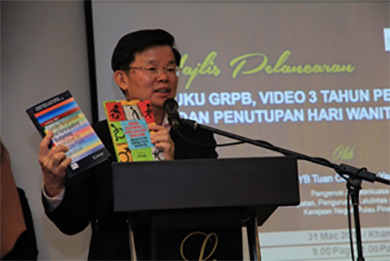 |
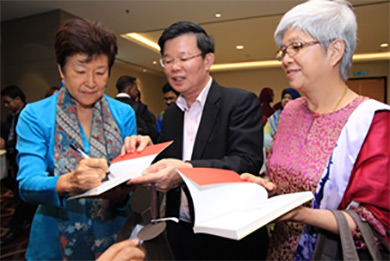 |